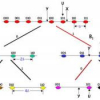Free Online Productivity Tools
i2Speak
i2Symbol
i2OCR
iTex2Img
iWeb2Print
iWeb2Shot
i2Type
iPdf2Split
iPdf2Merge
i2Bopomofo
i2Arabic
i2Style
i2Image
i2PDF
iLatex2Rtf
Sci2ools
124
click to vote
ICIP
2005
IEEE
2005
IEEE
Complexity/performance trade-offs for robust distributed video coding
In this work, we analytically study the complexity-performance trade-offs associated with video codecs based on the principle of source coding with side information at the decoder. We address three important aspects. First, we quantify the theoretical performance gains attained with side-information based codecs over prediction-based coders like MPEG under a lossy transmission scenario when there is drift. Secondly, we show that it is possible to closely approach MPEG's compression performance using sideinformation video coding principles with accurate DFD (Displaced Frame Difference) modeling even without sophisticated channel codes. Thirdly, we analytically show that the value of accurately estimating DFD statistics diminishes as the channel gets noisier.
Accurate Dfd | ICIP 2005 | Image Processing | Lossy Transmission Scenario | Side-information Based Codecs | Sophisticated Channel Codes | Video Coding Principles |
Related Content
| Added | 23 Oct 2009 |
| Updated | 27 Oct 2009 |
| Type | Conference |
| Year | 2005 |
| Where | ICIP |
| Authors | Abhik Majumdar, Rohit Puri, Prakash Ishwar, Kannan Ramchandran |
Comments (0)

